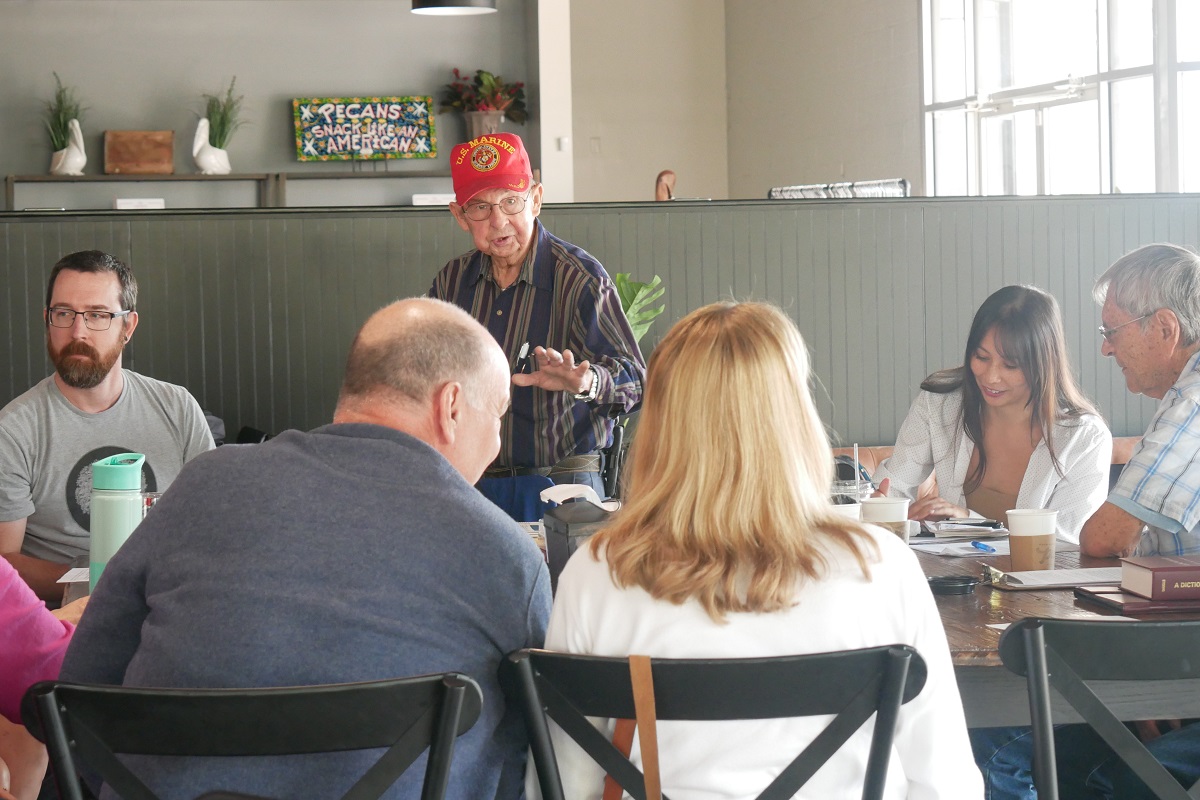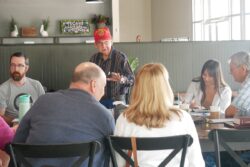Une place à la table
French tables help perpetuate Louisiana’s linguistic heritage
Published: May 31, 2023
Last Updated: August 31, 2023

Photo by Matt Mick
The Bayou Teche French table, with Rogers Romero (in red cap) and Becca Ezekiel (second from right).
To hear him speak, it would be easy to assume that French is Romero’s native language. Yet, for the first seventy-three years of his life, he had a relationship to the French language that is all too familiar to many Louisianans. “My mother and father spoke French all the time, and I’ve heard it all my life, but my parents didn’t want to speak French to us,” he lamented. Punishment in schools, social stigma, economic pressure—in the first half of the twentieth century, the impetus to assimilate into English-speaking America was strong. Romero, like so many of this linguistic “lost generation,” did not inherit the language of his ancestors.
But then, one morning about fifteen years ago, he drove home from Lafayette repeating one French phrase over and over to himself: “à la prochaine”—see you next time. At the age of seventy-three, he had just attended his first French table, and he hasn’t stopped since.
A French table is an organized meetup where people gather to speak French. Conversation groups like these can be found around the world, but in Louisiana, the French table is a tradition all its own. Across the state, there are dozens of groups with diverse structures, ambiences, and attendees. From rural public libraries to big-city bars, participants might play Pictionary, practice reading and writing, sing, or simply chat with each other. Most of the groups draw native speakers from within the community, although it’s not uncommon to also find language learners or the occasional French-speaking tourist.
After fifteen years of attending French tables, Romero has reclaimed the language he remembers his mother speaking, and now he leads his own group. One participant at the New Iberia table, Becca Ezekiel, is on a similar journey. She reflected on where she started: “When I went to my first table, I didn’t know anything, I couldn’t understand anything. I [was] training my ears, essentially.” She persisted and supplemented these speaking opportunities with her own independent study, using apps, movies, and books in French. Now, when it’s her turn at the table to read a phrase from the Dictionary of Louisiana French, the group nods and compliments her accent. “The French tables have been the biggest game changer for my language learning,” she said.
Romero agreed. “I encourage Becca or anyone else: attend as many French tables as you can. Physically speaking to people, face to face—can’t beat it.”
Find a calendar of French-language meetups at codofil.org/tables. For resources that can help you learn and practice French on your own, visit codofil.org/learn.
The Council for the Development of French in Louisiana (CODOFIL) is a state agency in the Department of Culture, Recreation, and Tourism tasked with the development and promotion of the French language in Louisiana. For more information on CODOFIL, visit www.codofil.org or email [email protected].
